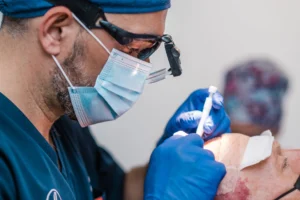
Medical tourism and black market hair transplant clinics
Reviewed by Dr Epameinondas Bonaros
Table of Contents

ISHRS launched a worldwide Patient Awareness Campaign to help patients identify fraudulent hair restoration clinics and misleading advertising claims. The black market of hair transplant clinics consists primarily of run by technicians. It is not uncommon for there to be one doctor and 30 technicians. The doctor at the clinic is mostly there for show. Sometimes, they don’t have a valid medical license or work permit. Ultimately, patients have no recourse if they feel that their healthcare has been compromised.
A survey of ISHRS members revealed that black-market hair transplants are widespread and harmful to patients worldwide. Medical professionals see the problem almost daily in those countries where the medical tourism industry is high. It is also an issue in every country, where greedy entrepreneurs and clinic owners instantly set up a hair transplant business without regard for their patient’s well-being. Patients are mainly assisted by unlicensed professionals, while the physician, if present, has little or no experience with the procedure.
It is common for illegal clinics to have sophisticated websites with Google ads that rank high on Google, capturing a consumer’s attention. The medical tourism industry is booming. Patients are attracted by the glamour of getting surgery done abroad but, unfortunately, do not get the results they were hoping for.
The reality is that someone may do your surgery without medical training. ISHRS members report problems like scarring, unnatural hairlines, poor hair growth, incorrect hair direction, depleted donor areas, infections and inaccurate graft counts. Sometimes patients are promised 4000-6000 grafts when in reality, they may only get half. Many FUE disasters have occurred in countries where patients are unaware of who is performing their procedure until it’s too late, and they suffer from botched complications.
It’s essential to do your research before considering a hair transplant in another country. The International Society of Hair Restoration Surgery (ISHRS) urges potential patients to do their homework before considering a hair transplant in another country, as laws and regulations on surgical procedures can be much different than those in their own country. Patients are encouraged to visit the ISHRS.org site and verify the doctor’s credentials.
Hair Transplants are safe when performed by a licensed and qualified hair transplant doctor. When non-doctors perform surgeries with little to no training, patients are at risk. Black market hair transplant clinics promise low prices and guaranteed results but can deliver disastrous results. A hair transplant is a major decision, so you should research your clinic and have a comprehensive aftercare plan. There is no room for shortcuts.
In this video, immense insights are shared regarding the escalating issue in our industry — the hair transplant “black market”. Prominent figures including Greg Williams, Chris D’Souza, Bessam Farjo, Harry Wallop, and myself, collectively partook in a live stream as a panel, diligently assembled by the BAHRS and ISHRS. The discussion broadly revolved around the potential risks associated with unethical hair transplant procedures.
Key subjects discussed during this thought-provoking session encompassed:
- Elucidation on the “Black Market” and associated hazards
- Guidelines for patients seeking ethical and reputable hair transplant surgeons
- The benefits linked to hair transplant surgeries
- Discerning between cosmetic and medical hair transplant treatments
- Potential “red flags” patients in the UK should stay vigilant about
- The delegation roles among non-doctors in this field
- Anticipated ethical standards from doctors and clinics conducting hair restoration procedures
- Recognising deceptive social media advertisements
The video sheds light through real-life stories from patients who’ve unfortunately encountered practices delegating surgeries to non-qualified practitioners. In essence, this live stream serves as an informative guide propelling patient safety and informed decision-making related to hair transplants, a mission very close to our hearts.
About the Medical Reviewer
This content was written and medically reviewed by Dr. Epameinondas Bonaros, a hair restoration specialist based in Glasgow.
Dr. Bonaros is a GMC-Registered Doctor (No. 7566786), a Diplomate of the ABHRS, and a Full Member of the ISHRS. Dr. Bonaros personally performs every FUE procedure at his clinic to ensure the highest standards of safety and clinical excellence.
Last medically reviewed: December 2025
Other posts you may like

How Hair Loss Can Affect You Psychologically
Alopecia, a disease resulting in hair loss, may not be a severe medical issue. However, in most cases, hair loss has a weighty impact on psychological well being.

Are Hair Transplants Painful?
Are Hair Transplants Painful? Many patients worry about experiencing pain during a hair transplant. This anxiety may cause you to delay hair transplant surgery. We know that hair loss can be a harrowing experience. Luckily, the solution doesn’t have to be distressing. If you are holding off on getting a

Can Women Have Hair Transplants?
Can Women Have Hair Transplants? Hair loss can be a distressing experience; no gender is spared. However, while hair transplantation is commonly associated with male pattern baldness and receding hairlines, women also take great care to consider hair restoration treatments. So, can women have hair transplants? Read further as we

Are you a good candidate for hair transplant surgery?
Hair transplants can be life-transforming. Unfortunately, not everyone is a suitable candidate.

Hair Transplant Cost in Glasgow Scotland
The cost of a hair transplant in Glasgow is an essential consideration for anyone seeking hair replacement options in and around Scotland.

Caffeine shampoos for hair loss
Low-dose oral minoxidil can be an alternative to topical minoxidil in the treatment of hair loss.

